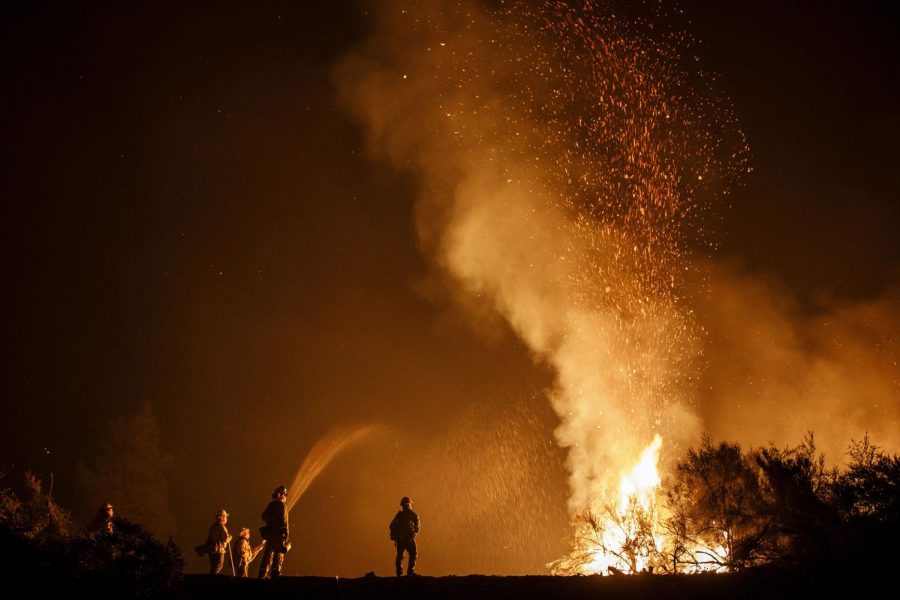California utility company powers fires
Photo Courtesy of Tribune News Service
Firefighters monitor a burn operation on top of a ridge near the town of Ladoga, Calif., on August 7, 2018.
February 13, 2019
After playing a role in deadly wildfires several years in a row, a California utility company is showing just how dangerous and unfair the modern utilities system is. Utility giant Pacific Gas and Electric Company (PG&E) has been the topic of national scrutiny for months as their careless business model has been linked to over a hundred deaths caused by dangerous wildfires across northern California. But because of the nature of the industry, they continue to be bailed out despite enormous fines and lawsuits.
Utility companies in the United States are natural monopolies. Of course, monopolies aren’t inherently illegal, but when the lack of competition allows shoddy work and inept operations, it becomes more dangerous than efficient. The utilities industry has enormous barriers of entry, but that should not dissuade safe work because of the lure of higher profits.
In the case of PG&E, a company with annual revenues of $17 billion, government bailouts and regulation of the industry have allowed the irresponsible energy provider to continue their profit-thirsty operations without improving safety year after fire-stricken year.
In their latest run in with lawsuits, PG&E is accused of turning a blind eye to faulty equipment and disregarding certain safety inspections. It has also been uncovered that they submitted more false inspection reports than initially believed, unveiling more fraudulent activity by the power provider.
Each time PG&E has made a critical gaffe, they have wiggled around shutting down and have been able to pass on the massive fines in the form of higher prices to their consumers. The current liabilities PG&E face, which total around $30 billion, will result in price hikes for citizens of northern California who are still playing a hand in paying off PG&E’s 2001 bankruptcy. It doesn’t seem fair for people’s bank accounts to go up in smoke because PG&E caused their neighbors’ houses to do the same.
Get The Daily Illini in your inbox!
However, if not even bankruptcy can save PG&E from the enormous financial exposure they face, there will be no justice as millions will have an energy crisis on their hands. Because of the lack of energy supply competition in northern California (and across America for that matter), for a new company to come in, secure PG&E’s assets and resume operations, it would cost even more for customers, and no company would be stupid enough to do so. Dethroning the tyrant powerhouse is simply not sensible enough to happen.
So, as it stands, PG&E will continue to provide energy to their 16 million customers and will somehow provide safer operations while also somehow maintaining liquidity. And now, more than ever, the company will be forced to counter the problem that made them declare bankruptcy in the first place: wildfires.
Now is not the time for PG&E — and any energy provider across the country — to allow poorly managed operations. Utility companies have always been one of the safest investments on Wall Street, but now that PG&E stock has plummeted as much as 87 percent due to liabilities, it is time for the industry to see significant developments. Utilities must abandon its bureaucratic ways of slow progress. Open markets have always proven to be the best, but PG&E is just the first example of the corruptness that can appear when companies mismanage.
And despite all their mismanagement that has — at the very least — indirectly led to the deaths of over 100 people, they are still paying out $130 million in incentive bonuses for 2018.
Because nothing screams bureaucracy like the CEO of a fraudulent firm receiving a massive bonus check as her operation watches the world burn.
Correction: A previous version of this article refers to the former CEO of PG&E as male. The Daily Illini regrets this error.
Fred is a freshman in Media.







